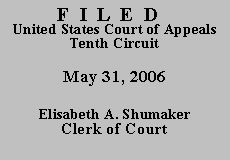

| RICHARD TAST,
Plaintiff-Appellant, v. JOHN A. DEAN, JR., an individual; JOHN AND JANE DOES, for each |
|
After the New Mexico Gaming Control Board denied Tast's application for a permit that would allow him to work in a New Mexico gaming facility, Tast filed a libel and slander action in New Mexico state court. See Tast v. N.M. Gaming Control Bd., No. D-116-CV-20042204 (N.M. 11th Jud. Dist. Ct.). While the state case was pending, Tast filed a § 1983 complaint against the presiding judge, Judge Dean, claiming that he lacked access to "competent courts of law within the State of New Mexico." He requested that the federal district court "enjoin those not lawfully holding public office," including Judge Dean, and stay the proceedings in the state case "until such time as that Court becomes duly competent." The federal district court dismissed the complaint for lack of jurisdiction under the Rooker-Feldman doctrine because the subject state proceedings remained pending.(1)
Under the Supreme Court's subsequent decision in Exxon Mobil Corp. v. Saudi Basic Industries Corp., 125 S. Ct. 1517 (2005), the district court clearly erred. The Court held that Rooker-Feldman applies only in "cases brought by state-court losers complaining of injuries caused by state-court judgments rendered before the district court proceedings commenced and inviting district court review and rejection of those judgments." Id. at 1521-22. Here, the New Mexico case had not come to a final judgment before Tast commenced his federal court proceeding. Thus, the Rooker-Feldman doctrine does not apply.
We may, however, affirm the district court's decision "on any grounds for which there is a record sufficient to permit conclusions of law, even grounds not relied upon by the district court." United States v. Sandoval, 29 F.3d 537, 542 n.6 (10th Cir. 1994) (quotation omitted). In Exxon Mobil, the Court noted that "[c]omity or abstention doctrines may, in various circumstances, permit or require the federal court to stay or dismiss the federal action in favor of the state-court litigation." Exxon Mobil, 125 S. Ct. at 1527. The defendant previously argued below that the district court should abstain under the Younger abstention doctrine.(2) Under this doctrine, "federal courts should not interfere with state court proceedings by granting equitable relief such as injunctions of important state proceedings or declaratory judgments regarding constitutional issues in those proceedings when a state forum provides an adequate avenue for relief." Weitzel v. Div. of Occupational & Prof'l Licensing, 240 F.3d 871, 875 (10th Cir. 2001) (quotation omitted). "Younger abstention is non-discretionary; the district court must abstain once the conditions are met . . . ." Id. (quotation omitted). These conditions are:
(1) there is an ongoing state criminal, civil, or administrative proceeding, (2) the state court provides an adequate forum to hear the claims raised in the federal complaint, and (3) the state proceedings involve important state interests, matters which traditionally look to state law for their resolution or implicate separately articulated state policies.
Id. (quotations omitted).
Each of the conditions is met in this case. The New Mexico case was pending throughout the period between Tast's filing of his complaint and the federal district court's ruling. Despite Tast's insistence that the state court is not a competent court, there is no record support for any inference that the state proceedings did not provide an adequate forum for Tast's claims. Finally, Tast's claims require interpreting the state constitution and state statutes. This constitutes an important state interest. Thus, the Younger abstention doctrine would have precluded the district court from adjudicating this action.
The judgment of the district court is AFFIRMED. Tast's motion entitled "Revisit the Motion for Writ of Quo Warranto" is DENIED.
Entered for the Court
Circuit Judge
*. After examining the briefs and appellate record, this panel has determined unanimously that oral argument would not materially assist the determination of this appeal. See Fed. R. App. P. 34(a)(2); 10th Cir. R. 34.1(G). The case is therefore ordered submitted without oral argument. This order and judgment is not binding precedent, except under the doctrines of law of the case, res judicata, and collateral estoppel. The court generally disfavors the citation of orders and judgments; nevertheless, an order and judgment may be cited under the terms and conditions of 10th Cir. R. 36.3.
1. See Rooker v. Fid. Trust Co., 263 U.S. 413 (1923); D.C. Court of Appeals v. Feldman, 460 U.S. 462 (1983).
2. See Younger v. Harris, 401 U.S. 37 (1971).